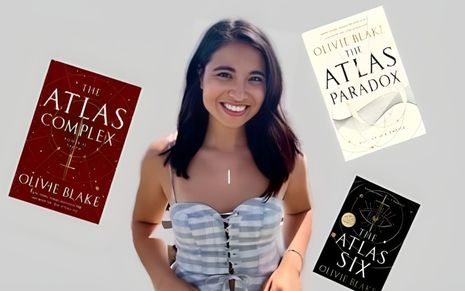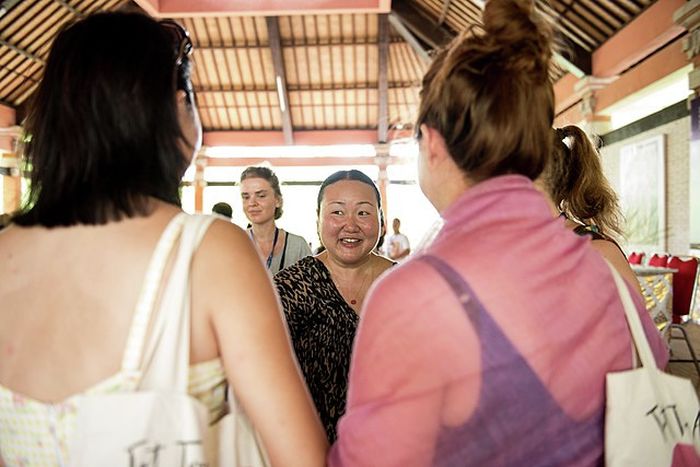‘It is plotless drivel – there’s a lot of soul’: bestselling author Olivie Blake
Dion Everett talks to New York Times bestselling author Olivie Blake about capitalism, self-publishing and unconventional voices

On Monday, I sat down for a call with Alexene Farol Follmuth, known by her pen name Olivie Blake. In 2021, her self-published novel The Atlas Six went viral on TikTok and Twitter and was picked up for traditional publishing by Tor Books. Now, they are re-releasing the rest of her works, most recently One For My Enemy – an urban fantasy about witch families’ blood feuds which came out this April.
“So much of publishing is luck”
After The Atlas Six went viral, you moved from self to traditional publishing. What was that process like?
I think that bookish social media is the same method of selling books that has always existed – word of mouth – but it’s now on a global scale on a platform where going viral is relatively easy. I always say that the success of Atlas has to do with the illustrations by Little Chmura, because it made for this really appealing visual virality – there was something to take a picture of to put on this highly visual media platform. My books had a lot of international interest, too. I was an internet fanfiction writer for years, so my audience was very beyond American, and I earned out my advance before the book published because my publisher was able to sell to other countries. People are always like “what did you do to make it go viral”, and I did nothing. It’s a very capitalist driven market, and so much of publishing is luck – the right audience at the right time, and the right people paying attention.
I definitely prefer traditional publishing. It was always my goal, but it was hard for me to break into because I have a voice that’s not conventional – I don’t have an MFA and I wasn’t a literature major. I’m writing with no formal training. That’s where the voice comes from. It’s untrained but not in a bad way – in an organic way, let’s say.
Do you think that part of the reason that Atlas, as opposed to your other books, went viral was because of this growing interest in the genre of critiquing academia?
“We all want desperately to be accepted by this institution, but some of us never will be”
I had the right aesthetic at the right time, definitely. It’s interesting to see how the landscape of expectations for dark academia has shifted. A lot of people who were attracted to Atlas at first were interested in the criticism that’s embedded into it. It’s an anti-capitalist book. I find it very interesting that – because Atlas has a lot of commercial success – there are arguments that it’s not as intellectual or high-minded as other books of that kind, as if people are only enjoying it for the aesthetic. The Atlas Trilogy is about the ethics of capitalism and how we remedy the sins of the past, but since it had BookTok slapped on the cover, people are like “this is soulless drivel”. If anything, it is plotless drivel – there’s a lot of soul! That’s my joke to myself.
The love for Atlas that’s really true, though, was that it was one of those contributing voices about “let’s look at what academia really is and how we have this toxic relationship with it”. We all want desperately to be accepted by this institution, but some of us never will be.
It’s a book that’s very character voiced, so I think it’s very easy to call it shallow because there’s not a lot of plot, but it’s actually all about the voice and not about the plot.
“It’s a timeless argument about whether something has value if people love it”
Yeah, they really don’t know how to sell it for what it is. I don’t want to reject the presence of tropes or that the book is pulpy, because it is. It has a very pulpy hook – someone’s gonna get murdered! – and all these people are a little bit in love with each other. I’m trying to hide the medicine, and I think that’s what makes it very easy to dismiss. I was looking at the list of who’s eligible for the Nebula or Locus awards, and I understand that that’s not going to be me because people don’t see the books that way. I understand where I have been placed by publishing as an industry, and I’ve come round to accepting it. The book is commercially successful among young people, and young women. It’s a timeless argument about whether something has value if people love it.
Publishing is being as innovative as it knows how to be. It’s a dinosaur of an industry, but it’s beneficial that they’re able to recognise that their demographic is changing. The only question has become how we clearly enunciate the audience of this book. I’m grateful to social media, because it’s made it easier to say what the taste is and show the audience – rather than having to guess off sales.
 News / Uni commits to partial arms divestment after year-long review20 October 2025
News / Uni commits to partial arms divestment after year-long review20 October 2025 Comment / Nathan Cofnas shouldn’t be silenced 20 October 2025
Comment / Nathan Cofnas shouldn’t be silenced 20 October 2025 Arts / Why Cambridge’s architecture never lives up to the ‘dark academia’ dream 17 October 2025
Arts / Why Cambridge’s architecture never lives up to the ‘dark academia’ dream 17 October 2025 News / How much does your college master earn?17 October 2025
News / How much does your college master earn?17 October 2025 Lifestyle / My third year bucket list17 October 2025
Lifestyle / My third year bucket list17 October 2025










